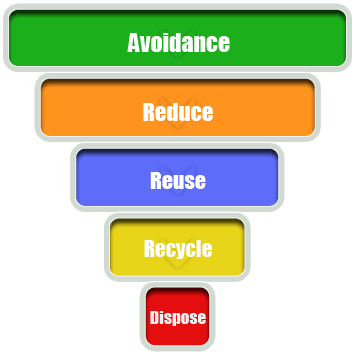
 Waste Minimisation:
Waste Minimisation:
Waste is a part of everyday living. Australians produce over 18 million tonnes of waste per year. Every piece of waste produced and disposed of to landfill means that valuable natural resources have been lost and landfill space reduced. However there are many things that we can do to minimise the amount of waste we produce and dispose of that will benefit our local and global environments.
The Waste Hierarchy
The Waste Management Hierarchy outlines the actions we all must follow in order to achieve a more sustainable future. Avoiding, reducing, reusing and recycling are the simple actions that we can all practice to minimise waste.
1. Avoidance:
Avoiding waste altogether is a great place to start. Do I really need this item? Avoidance is also about selecting a product that has the least packaging or required less resources to produce and therefore impacts our our environment less.

- Cut packaging and buy fruit and vegetables loose where practical.
- Choose minimally packaged goods.
- Stop and think if you really need a plastic bag.
- Avoid disposable goods and buy goods that are recycled, recyclable, repairable, refillable, reusable and biodegradable.
- Reuse cardboard boxes where possible.
- Buy goods in returnable or recyclable glass, metal or plastic.
- Ask for recycled paper at stationers and printers.
- Buy an energy efficient appliance.
- Have a paper recycling bin handy at home and work.
- Buy products in bulk.
2. Reduce:
Consuming products with less waste is the most effective means of minimising waste. Buy less rubbish when you are shopping and become aware of what you will end up discarding in the bin. Always look for recyclable or reusable packaging.
3. Reuse:
Reusing means to find another use for an item so it reduces the cost of buying a new one, and saves on energy and resources needed to make a new product. A lot of household items can often be repaired, reused, sold or given to charities. Residents can also reuse food scraps, garden clippings and leaves by composting or worm farming.
4. Recycle:
Recycling involves collecting and sorting discarded goods so that they can be remade into products with much less impact on our environment than when making them from raw materials.